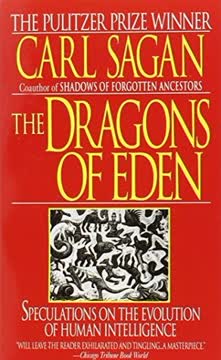Key Takeaways
1. Human Evolution is a Journey of Cultural and Biological Transformation
"Unlike the creatures (some insects, for instance) that have been unchanged for five, ten, even fifty million years, he has changed over this time-scale out of all recognition."
Continuous Adaptation. Human evolution is not a linear process but a complex interplay between biological and cultural transformations. Unlike other species that remain relatively static, humans have demonstrated remarkable adaptability through technological and social innovations.
Key Evolutionary Milestones:
- Development of tool-making capabilities
- Emergence of complex language
- Agricultural revolution
- Technological advancements
Transformative Potential. Humans are unique in their ability to reshape their environment and themselves, constantly pushing the boundaries of biological and cultural limitations through imagination, creativity, and technological innovation.
2. Science and Creativity Are Expressions of Human Plasticity
"Man is unique not because he does science, and he is unique not because he does art, but because science and art equally are expressions of his marvellous plasticity of mind."
Cognitive Flexibility. Human intellectual achievement stems from our extraordinary ability to think, create, and adapt across diverse domains, blending scientific reasoning with artistic imagination.
Manifestations of Plasticity:
- Leonardo da Vinci's scientific and artistic pursuits
- Interdisciplinary innovations
- Complex problem-solving
- Cross-domain thinking
Intellectual Evolution. Our capacity to learn, unlearn, and reimagine enables unprecedented cognitive growth and understanding of the world around us.
3. Technology and Invention Drive Societal Progress
"A machine is a device for tapping the power in nature."
Technological Transformation. Human progress is fundamentally driven by our ability to understand, harness, and manipulate natural resources through technological innovation.
Technological Milestones:
- Steam engine
- Industrial Revolution
- Electricity
- Digital computing
- Renewable energy technologies
Societal Impact. Technological advancements not only improve material conditions but also reshape social structures, communication, and human potential.
4. Understanding Nature Requires Exploring Its Hidden Structures
"The world can only be grasped by action, not by contemplation."
Scientific Discovery. True understanding of natural phenomena emerges through active exploration, experimentation, and a willingness to challenge existing paradigms.
Scientific Approach:
- Empirical observation
- Hypothesis testing
- Technological innovation
- Interdisciplinary collaboration
Structural Insights. Uncovering the underlying patterns and structures in nature requires both analytical precision and creative imagination.
5. Knowledge is Always Provisional and Uncertain
"There is no absolute knowledge. And those who claim it, whether they are scientists or dogmatists, open the door to tragedy."
Epistemological Humility. Scientific understanding is inherently tentative, requiring continuous questioning, revision, and openness to new evidence.
Principles of Knowledge:
- Embrace uncertainty
- Challenge existing assumptions
- Maintain intellectual flexibility
- Practice critical thinking
Intellectual Integrity. Recognizing the limitations of human knowledge prevents dogmatism and promotes continuous learning.
6. Diversity and Adaptation Are Fundamental to Survival
"Evolution is founded in variety and creates diversity; and of all animals, man is most creative because he carries and expresses the largest store of variety."
Biological Imperative. Genetic and cultural diversity are essential mechanisms for species survival and adaptation.
Diversity Mechanisms:
- Sexual reproduction
- Genetic variation
- Cultural exchange
- Intellectual innovation
Evolutionary Advantage. Diversity enables species to respond more effectively to changing environmental challenges.
7. Human Uniqueness Lies in Our Capacity for Learning and Imagination
"The hand is the cutting edge of the mind. Civilisation is not a collection of finished artefacts, it is the elaboration of processes."
Cognitive Development. Humans are distinguished by their ability to learn, create, and transform their environment through imagination and skill.
Distinctive Human Capacities:
- Abstract thinking
- Tool creation
- Complex communication
- Anticipatory planning
Intellectual Potential. Our capacity for continuous learning and adaptation sets us apart from other species.
8. Social Responsibility and Justice Are Biological Imperatives
"Man alone aspires to be both social and solitary. And to me that is a unique biological feature."
Moral Evolution. Social responsibility and justice are fundamental aspects of human biological and cultural development.
Social Principles:
- Cooperative behavior
- Empathy
- Ethical decision-making
- Collective problem-solving
Evolutionary Significance. Our ability to balance individual needs with collective well-being represents a sophisticated evolutionary adaptation.
9. Sexual Selection and Cultural Evolution Are Interconnected
"Sex was invented as a biological instrument by the algae. But as an instrument in the ascent of man which is basic to his cultural evolution, it was invented by man himself."
Biological and Cultural Interaction. Sexual selection plays a crucial role in human cognitive and cultural development.
Selection Mechanisms:
- Intellectual compatibility
- Skill-based mate selection
- Cultural preferences
- Genetic diversity
Evolutionary Dynamics. Human sexual behavior reflects complex interactions between biological imperatives and cultural innovations.
10. Our Long Childhood Enables Unprecedented Cognitive Flexibility
"In man, before the brain is an instrument for action, it has to be an instrument of preparation."
Developmental Advantage. Extended human childhood allows for complex cognitive development and learning.
Childhood Characteristics:
- Delayed gratification
- Cognitive plasticity
- Extended learning period
- Complex skill acquisition
Evolutionary Strategy. Prolonged childhood enables humans to develop sophisticated cognitive and social capabilities.
Last updated:
FAQ
What's The Ascent of Man about?
- Human evolution and progress: The book explores the development of human society through scientific understanding, from early inventions to modern theories.
- Cultural evolution focus: It emphasizes cultural evolution, showcasing how human inventions reflect our ability to understand and control nature.
- Interdisciplinary approach: Combining history, science, art, and philosophy, it provides a comprehensive view of humanity's intellectual journey.
Why should I read The Ascent of Man?
- Accessible science: As one of the first 'popular science' works, it makes complex ideas accessible to a general audience.
- Historical context: Offers a rich historical and social context for scientific developments, illustrating the interplay between science and civilization.
- Inspiring perspective: Encourages appreciation for human creativity and the importance of questioning established knowledge.
What are the key takeaways of The Ascent of Man?
- Human creativity is central: The book argues that invention and creativity distinguish humans, encapsulated in the phrase, “The hand is the cutting edge of the mind.”
- Science and art connection: Both are expressions of human imagination, highlighting the marvellous plasticity of the mind.
- Cultural peaks: It outlines significant cultural peaks, showing how discoveries build upon previous knowledge, forming an ascending trellis of human faculties.
What are the best quotes from The Ascent of Man and what do they mean?
- “Knowledge … is an unending adventure at the edge of uncertainty.”: Emphasizes the continuous pursuit of knowledge and embracing uncertainty.
- “Civilisation is not a collection of finished artefacts, it is the elaboration of processes.”: Highlights civilization as ongoing development rather than static achievements.
- “The most powerful drive in the ascent of man is his pleasure in his own skill.”: Reflects the intrinsic motivation behind creativity and innovation.
How does The Ascent of Man connect science and culture?
- Interconnected development: Scientific advancements are deeply rooted in cultural contexts, shaped by societal needs and values.
- Historical examples: Provides examples like the transition from nomadic to settled societies to show cultural influence on scientific progress.
- Philosophical implications: Suggests understanding nature is about understanding human nature, reflecting cultural evolution.
What role does mathematics play in The Ascent of Man?
- Foundation of scientific thought: Mathematics is crucial for understanding the natural world, exemplified by Pythagoras’ theorem.
- Link to harmony: Discusses how mathematical relationships reflect the universe's order, connecting mathematics and nature.
- Evolution of concepts: Traces mathematical ideas from ancient to modern times, highlighting figures like Pythagoras and Newton.
What is the significance of fire in The Ascent of Man?
- Transformative power: Fire allows humans to manipulate materials, leading to metallurgy and other technologies.
- Alchemy and science: Discusses alchemy's historical significance, showing how fire manipulation laid chemistry's groundwork.
- Symbol of knowledge: Represents the quest for knowledge and the ability to change the world, symbolizing human ingenuity's potential and dangers.
How does Bronowski define cultural evolution in The Ascent of Man?
- Cultural peaks: Describes cultural evolution as peaks where discoveries build upon previous knowledge, creating a web of achievement.
- Human faculties: Reflects the development of imagination and reasoning, enabling adaptation and innovation.
- Interplay with biology: Distinguishes cultural evolution from biological evolution, highlighting human influence on the environment.
How does The Ascent of Man address the relationship between art and science?
- Shared human experience: Argues both art and science stem from the impulse to explore and understand the world.
- Cultural expressions: Shows how artistic expressions often reflect scientific understanding, incorporating mathematical principles.
- Creativity as a driving force: Posits that creativity in both fields is driven by a desire to express and understand human existence.
What is the overall message of The Ascent of Man?
- Celebration of human achievement: Celebrates humanity's journey through science and culture, emphasizing creativity and innovation.
- Call for curiosity: Encourages embracing curiosity and the pursuit of knowledge as an ongoing adventure.
- Interconnectedness of knowledge: Asserts that all forms of knowledge are interconnected, reflecting our understanding of ourselves.
What is the significance of Gregor Mendel's work in The Ascent of Man?
- Foundation of genetics: Mendel's experiments established heredity principles, laying modern genetics' groundwork.
- All-or-nothing inheritance: Proposed traits are inherited in discrete units, challenging the blend of parental traits belief.
- Rediscovery impact: His findings, rediscovered in the 20th century, revolutionized biology understanding.
What is the importance of the "Principle of Uncertainty" in The Ascent of Man?
- Limits of knowledge: Highlights that all knowledge is limited and subject to interpretation, challenging absolute certainty.
- Statistical nature of reality: Explains uncertainty as a fundamental universe aspect, leading to a nuanced scientific view.
- Encouragement of humility: Reminds scientists to approach knowledge with humility, recognizing inherent complexities and uncertainties.
Review Summary
The Ascent of Man is a thought-provoking exploration of human scientific and cultural evolution. Readers praise Bronowski's eloquent writing, breadth of knowledge, and ability to connect art and science. The book, based on a BBC documentary series, covers topics from early human history to modern physics. While some find the scientific details occasionally overwhelming, most appreciate Bronowski's insights into human progress and creativity. Some readers note that certain information is outdated, given the book's 1973 publication date, but still consider it a valuable and inspiring read.
Similar Books









Download PDF
Download EPUB
.epub digital book format is ideal for reading ebooks on phones, tablets, and e-readers.




